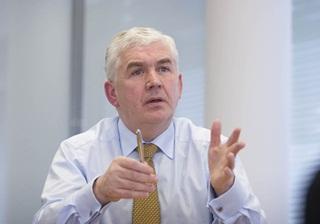Reasons to be hopeful for health in 2011

Despite the hefty cut to the health budget in the year ahead, the HSE Service Plan launched in Christmas week provides some rare optimism for 2011. By Sara Burke
HSE CEO Cathal McGee (pictured) launched the HSE Service Plan for 2011 three days before Christmas. Once again the HSE is planning to improve patient care with less money and fewer staff. So what, if anything, is different about this plan and can they really do it without hurting patient care?
The HSE Service Plan is the most important document the HSE publishes any year as it is the HSE's contract with the government and the people about how many and what type of services it will provide within the budget allocated.
At the service plan launch HSE CEO Cathal McGee outlined how it was possible for the HSE to live within their €683 million budget shortfall and not cut frontline services. McGee outlined how they have negotiated €200 million in savings from the drugs budget, €200 million for cutting suppliers costs, and €200 million in reduced staff pay. And even though headline areas such as hospitals look like they are getting a cut in budget, if you look in detail at where the cuts are, it is achieved via these non-frontline areas.
The commitment is to provide the same amount of services "or close to current levels" in 2011 as in 2010. Technically, as we are an ageing, growing population with increasing levels of disease, that could be considered a cut but in current circumstances, it is very welcome that the plan is not to cut services.
McGee gave a stellar performance at the briefing. Just four months in office, he came across as a man on top of his brief. There was also a very clear and significant shift in language but also in policy. It was a complete departure from Brendan Drumm's language of doing more with less, cutting hospital beds, transformation, lots of jargon – to a much simpler, clearer, straight talking presentation.
And in terms of policy, there was also an apparent seismic shift – McGee was asked specifically, if the plan is to reduce hospital bed numbers. McGee clearly said no; whereas Drumm's emphasis was on closing beds and shifting care to the community, McGee's emphasis was about providing different types of appropriate care in the right places but fundamentally not cutting hospital beds.
Also in attendance at the launch were three of the new clinical leads in the HSE. It's a first to see senior medics at the top table with HSE management.
They were there to endorse the emphasis on clinical care pathways but also the HSE's Acute Medicine's Programme. The clinical programmes are being headed up by Barry White – the national director of clinical and quality care. What Barry White is doing is applying the model of cancer care introduced by Tom Keane to all diseases and all aspects of care.
Shane O'Neill, one of the clinical leads in acute medicine, outlined how 50-60% of hospital patients and 75% of hospital costs are acute patients but there are better, maybe even cheaper ways, of dealing with them.
He gave the example of an older woman living at home, who has severe shortness of breath. At the moment she would either get GP treatment or go to an Emergency Department. Under the new scheme, there will be many more options, she may need direct same day referral to out patient respiratory care or to specialised care for the elderly or to an acute medicine unit but not to an Emergency Department.
The plan has the possibility to reorganise, maybe even revolutionise, how health and social care is provided in Ireland in a much more bottom up way, including doctors, all health care professionals and patients.
And is it just fantasy to think they can do this now when they have the smallest budget they have had in years? Maybe, but if these clinical programmes work and Cathal McGee proves as effective as he comes across then there is reason to be hopeful for having a much better system coming out of the economic crisis than we did going in to it.
The HSE Service Plan acknowledged the significantly lower number of people taking up the HSE early retirement/voluntary redundancy scheme. The HSE budgeted for €123 million in savings next year as a result of the scheme, although Mary Harney originally envisaged €200 million in savings.
From what McGee said, it will be under €90 million in savings. But he also indicated that he would be going back to the Departments of Finance and Health saying "You devised this scheme, it did not get the savings you predicted so therefore you need to make up the shortfall".
He also spoke about risks of the additional need for medical cards beyond what is already built into the service plan because of the broader economic environment. Again, one can imagine McGee going back to the Departments of Finance or Health on this – pointing out that it is their responsibility to cover this extra cost.
Cathal McGee acknowledged the immense challenge facing the HSE but that they had no choice but to step up and deliver this plan. Lets hope they do... Given that 2010 was a miserable year and the HSE seem to have a good plan and a good leader – why not be optimistic for 2011!
Also, a change of government looms, and for the first time in the history of the State, all opposition parties are advocating a universal health system free at the point of delivery, albeit in different ways. And that's another real reason to be hopeful in the year ahead.
